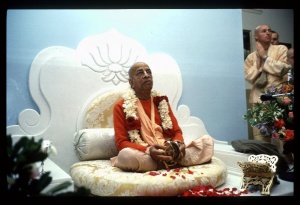CC Adi 17.200 (1975): Difference between revisions
(Vanibot #0027: CCMirror - Mirror CC's 1996 edition to form a basis for 1975) |
(Vanibot #0020: VersionCompareLinker - added a link to the Version Compare feature) |
||
| Line 2: | Line 2: | ||
<div style="float:left">'''[[Sri Caitanya-caritamrta (1975)|Śrī Caitanya-caritāmṛta (1975)]] - [[CC Adi (1975)|Ādi-līlā]] - [[CC Adi 17 (1975)|Chapter 17: The Pastimes of Lord Caitanya Mahāprabhu in His Youth]]'''</div> | <div style="float:left">'''[[Sri Caitanya-caritamrta (1975)|Śrī Caitanya-caritāmṛta (1975)]] - [[CC Adi (1975)|Ādi-līlā]] - [[CC Adi 17 (1975)|Chapter 17: The Pastimes of Lord Caitanya Mahāprabhu in His Youth]]'''</div> | ||
<div style="float:right">[[File:Go-previous.png|link=CC Adi 17.199 (1975)|Ādi-līlā 17.199]] '''[[CC Adi 17.199 (1975)|Ādi-līlā 17.199]] - [[CC Adi 17.201-202 (1975)|Ādi-līlā 17.201-202]]''' [[File:Go-next.png|link=CC Adi 17.201-202 (1975)|Ādi-līlā 17.201-202]]</div> | <div style="float:right">[[File:Go-previous.png|link=CC Adi 17.199 (1975)|Ādi-līlā 17.199]] '''[[CC Adi 17.199 (1975)|Ādi-līlā 17.199]] - [[CC Adi 17.201-202 (1975)|Ādi-līlā 17.201-202]]''' [[File:Go-next.png|link=CC Adi 17.201-202 (1975)|Ādi-līlā 17.201-202]]</div> | ||
{{CompareVersions|CC|Adi 17.200|CC 1975|CC 1996}} | |||
{{RandomImage}} | {{RandomImage}} | ||
==== TEXT 200 ==== | ==== TEXT 200 ==== | ||
<div class="verse"> | <div class="verse"> | ||
:sei haite jihvā mora bale | :sei haite jihvā mora bale 'hari' 'hari' | ||
:icchā nāhi, tabu bale, | :icchā nāhi, tabu bale,--ki upāya kari | ||
</div> | </div> | ||
| Line 18: | Line 17: | ||
<div class="synonyms"> | <div class="synonyms"> | ||
sei haite—from that time; jihvā—tongue; mora—my; bale—says; hari hari—the vibration | sei haite—from that time; jihvā—tongue; mora—my; bale—says; hari hari—the vibration "Hari, Hari"; icchā—desire; nāhi—there is none; tabu—still; bale—says; ki—what; upāya—means; kari—I may do. | ||
</div> | </div> | ||
| Line 25: | Line 24: | ||
<div class="translation"> | <div class="translation"> | ||
" 'Since that time, my tongue also always vibrates the sound "Hari, Hari." I have no desire to say it, but still my tongue says it. I do not know what to do.' | |||
</div> | </div> | ||
Latest revision as of 16:14, 26 January 2020

A.C. Bhaktivedanta Swami Prabhupada
TEXT 200
- sei haite jihvā mora bale 'hari' 'hari'
- icchā nāhi, tabu bale,--ki upāya kari
SYNONYMS
sei haite—from that time; jihvā—tongue; mora—my; bale—says; hari hari—the vibration "Hari, Hari"; icchā—desire; nāhi—there is none; tabu—still; bale—says; ki—what; upāya—means; kari—I may do.
TRANSLATION
" 'Since that time, my tongue also always vibrates the sound "Hari, Hari." I have no desire to say it, but still my tongue says it. I do not know what to do.'
PURPORT
Sometimes demoniac nonbelievers, not understanding the potency of the holy name, make fun of the Vaiṣṇavas when the Vaiṣṇavas chant the Hare Kṛṣṇa mahā-mantra. This joking is also beneficial for such persons. Śrīmad-Bhāgavatam, Sixth Canto, Second Chapter, verse 14, indicates that the chanting of the Hare Kṛṣṇa mahā-mantra, even in joking, in the course of ordinary discussion, in indicating something extraneous, or in negligence, is called nāmābhāsa, which is chanting that is almost on the transcendental stage. This nāmābhāsa stage is better than nāmāparādha. Nāmābhāsa awakens the supreme remembrance of Lord Viṣṇu. When one remembers Lord Viṣṇu, he becomes free from material enjoyment. Thus he gradually comes forward toward the transcendental service of the Lord and becomes eligible to chant the holy name of the Lord in the transcendental position.